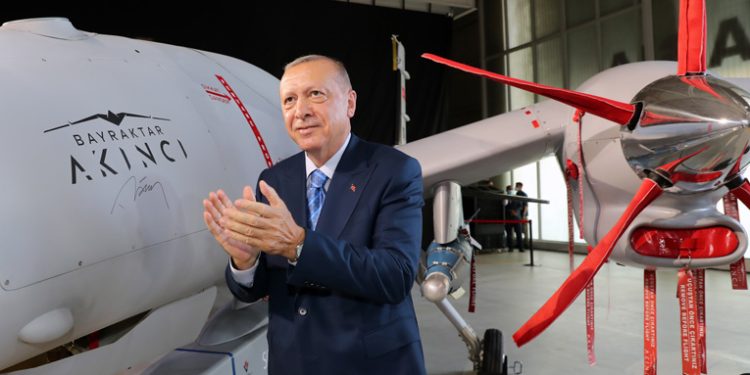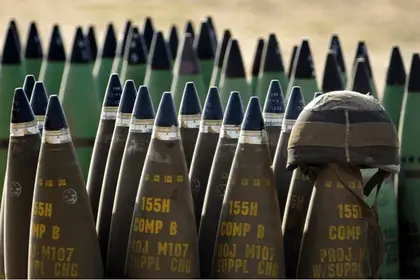Greece will become a key supplier of shells in a Czech Republic initiative to get emergency deliveries of artillery worth around $1.9 billion to Ukraine, news reports said on Tuesday.
The munitions will come from Greek army warehouses and their transfer to Ukraine, costing about $156 million, will be reimbursed by other nations, said Minister of Defense Ioannis Kefalogiannis in a briefing to the parliament standing committee on Armament Programs and Contracts, Doureios news reported.
JOIN US ON TELEGRAM
Follow our coverage of the war on the @Kyivpost_official.
In late March, Prague announced that at least 14 European nations had responded to an appeal to help fund purchases of artillery ammunition outside the EU – in order to fill a long-running shell shortage faced by the Ukrainian military.
Currently, according to field reports, Russian artillery by quantities of shells fired out-shoots its Ukrainian counterpart by four or five to one.
Near-starvation of ammunition in Ukrainian artillery units was widely reported by mid-January due to insignificant domestic production, a glacial slow ramp-up of European shell manufacturing, and a US ban on all arms deliveries to Ukraine since December thanks to a Congressional impasse.
The munitions are shells, fuses and propellant for medium and large caliber guns and can safely be removed from Greek army inventory because they either belong to old production lots or fit weapons no longer in Greek service, and the transfers can take place “immediately,” Kefalogiannis said.

Zelensky’s Top General Syrsky Admits Ukraine’s Army Faces Challenges – But Says Fixes Are Coming
According to the Athens-headquartered iEidisies news agency, a key component of the Grecian bulk up to Ukraine will be shells for the 155mm NATO-standard cannon, a widely used and, with the Ukrainian army, highly popular system, first introduced to the Russo-Ukrainian War in May 2022.
Forklift operator moves a pallet of NATO-standard 155mm ammunition at an unidentified military base. Image published on 01.04.2024 by mil.in.ua.
Other ammo to be sold by Athens, and usable by systems known to be in operation by Kyiv’s forces, include Cold War-era 30mm and WW2-era 40mm anti-aircraft shells, Vietnam-era 203mm heavy artillery shells, and modern 105mm anti-tank and high explosive shells, the report says.
The US-manufactured 203mm munition, known in the Pentagon as 8-inch shell, dates back to the Vietnam era. Ukraine operates a similar caliber Soviet-era 2S7 Pion howitzer. Ukrainian gunners value the weapon for its long range and accuracy. According to Ukrainian news reports, US-made 203mm shells can be fired from the Ukrainian Pion howitzers.
The iEidiseis reports that Greek ammo dumps contain 175mm shells in “huge quantities” and that the munition would become part of the ammunition delivery to Ukraine, the report says.
According to the Netherlands-based tracking site Oryx, Ukraine has never received artillery systems capable of firing the American 1960s-era 175mm heavy shell. The iEidiseis report said that “a small number of 175mm cannon remain in service” in the Greek military, but “many systems require maintenance.”
The total value of Greek ammunition and equipment to be transferred to Ukraine, idEdiseis reported, would be equivalent to $185 million, some $29 million more than the expected price of shells to be sold by Greece to the Czech purchasing cooperative, per reports in Doureios and other European major media.
Prague officials in early March called on nations supporting Ukraine to pool resources and help finance a Czech-led worldwide search for artillery shells to send to Kyiv.
By early April more than 15 countries had promised $1.9 billion, slightly more than double Prague’s initial request for $800 million to purchase 500,000 155-mm NATO-standard artillery shells and 300,000 Soviet-standard 122mm shells abroad.
Thank you note to Prague published by the Ukraine Ministry of Foreign Affairs on March 26.
Germany is the largest contributor, with Berlin officials over April 1-2 announcing Berlin will fund 40 percent of all ammunition purchased by the Czech-led cooperative, and promising to donate 180,000 shells made by Germany’s Rheinmetall.
Other major supporters of the initiative having made public the value of planned contributions include Belgium ($215 million), the Netherlands ($165 million) and Norway ($153 million). France, Sweden, Portugal, Canada, and Lithuania also are participating but their announced contributions are a good deal smaller. Stockholm, for its part, has promised $30 million.
Czech weapons buyers are, according to Ukrainian news reports, planning, or have made major artillery shell purchases in South Korea, Turkey, and South Africa. Talks with large-scale manufacturers in Bulgaria and India have been reported.
While in Ukraine, Estonian Defense Minister Hanno Pevkur, in comments reported by the Postimees newspaper on March 24, said that under normal circumstances the time interval from purchase to delivery for shells from international markets was around two months.
The Russian military, also hit with shell deficits, is competing with Ukraine’s allies in international markets for Soviet-standard calibers, Pevkur said, particularly for the 122mm and 152mm artillery round and the 122mm artillery rocket. Rising demand combined with limited increased production capacity has spiked the price of a single 155mm artillery shell in world markets to about $2,200 each, he said.
Pevkur predicted that by the end of 2024 European production would grow to 1.4 million shells, and by the end of 2025 the figure would rise to two million shells a year, or about 80 percent of Ukraine’s annual battle needs.
Were the United States to assist, then nations supporting Ukraine would be reasonably capable in twelve months of not only eliminating the Ukrainian army’s current yawning artillery ammunition deficit, but of giving Kyiv a possibly decisive artillery advantage over Moscow, he said.
According to the Ukrainian military information publication armyrecognition.com, hard-pressed Pentagon logistics commanders charged to maintain US stocks, provide artillery ammunition to Israel, and keep a White House promise to support Ukraine “as long as it takes” in the face of Congressional refusal to pay for it, have turned to manufacturers in Türkiye to forestall looming American 155mm shell deficits.
The article names the Turkish state company Roketsan and the Turkish government research agency Tubitak as Ankara’s main producers currently filling American shell orders.
The United States in recent months has already purchased 116,000 artillery shells “from a Turkish company, with prospects for additional purchases,” as well as trinitrotoluene (TNT) and nitroguanidine, the key chemicals for shell explosives and propellant, the report says.
The US-Turkish ammunition collaboration project will see heavy Turkish investment in American shell manufacturing, and the Turkish company Rekon will, by 2025, have built three new production lines in Texas, manufacturing about 30 percent of all 155mm artillery shells produced in the United States, the report says.
Turkish President Recep Tayyip Erdogan and his American counterpart Joe Biden are scheduled to meet at the White House on May 9. Details of the US-Turkey joint ammunition production project are likely to be announced then, the article says.

Turkish President Recep Tayyip Erdogan claps for workers during a visits to a factory owned by the military drone manufacturer Bayraktar. According to the news report “Trends in International Arms Transfers 2022,” published by the Stockholm International Peace Research Institute, Turkey’s arms exports increased by 69 per cent from 2018 to 2022 comparing to 2013-2017. Official image from the Turkish Office of the President.
In Europe, the German defense giant Rheinmetall has announced plans to produce 700,00 shells annually by the end of 2024 and – with the start-up of new factories planned in Germany, Ukraine and Lithuania – to produce more than a million artillery shells annually by 2027. Governments in Denmark, Finland, Sweden, and Norway also have announced the intention to expand artillery shell production.
You can also highlight the text and press Ctrl + Enter












